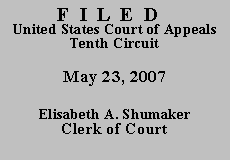

| ROBERT L. MILLER,
Plaintiff-Appellant, v. MICHAEL J. ASTRUE,(*) Commissioner of the Social Security Administration, Defendant-Appellee. |
|
Mr. Miller claimed disability beginning February 20, 2003, due to status post spinal meningitis, hypertension, and reduced vision. The Administrative Law Judge ("ALJ") denied benefits after finding that Mr. Miller did not have a severe impairment or combination of impairments as is required at step two of the five-step evaluation process. See 20 C.F.R. § 404.1520 (describing five-step evaluation process). The Appeals Council considered the new medical evidence Mr. Miller submitted after the hearing but nonetheless affirmed the ALJ's decision.(1) We have jurisdiction under 28 U.S.C. § 1291 and 42 U.S.C. § 405(g), and we affirm.
In this appeal, Mr. Miller has raised the same issues he raised in the district court, namely that the Commissioner (1) failed to make a proper evaluation at step two of the sequential evaluation process, (2) failed to fully and fairly develop the record, and (3) improperly assessed his credibility.
Mr. Miller's arguments are without merit. In its well-reasoned order, the district court thoroughly analyzed each of Mr. Miller's claims using the same standard of review that governs our review, see Aplt. App. Vol. I at 16-17, and we find the district court's analysis and conclusions to be persuasive on each point, id. at 18-22. Accordingly, we see no reason to repeat the district court's analysis, and we affirm for substantially the same reasons set forth in the district court's order.
Entered for the Court
Circuit Judge
*. Pursuant to Fed. R. App. P. 43(c)(2), Michael J. Astrue is substituted for Jo Anne B. Barnhart as appellee in this appeal.
2. After examining the briefs and appellate record, this panel has determined unanimously to grant the parties' request for a decision on the briefs without oral argument. See Fed. R. App. P. 34(f); 10th Cir. R. 34.1(G). The case is therefore ordered submitted without oral argument. This order and judgment is not binding precedent, except under the doctrines of law of the case, res judicata, and collateral estoppel. It may be cited, however, for its persuasive value consistent with Fed. R. App. P. 32.1 and 10th Cir. R. 32.1.
1. After the hearing before the ALJ, Mr. Miller was diagnosed with hepatitis. Aplt. App. Vol. II at 144. This new evidence, along with other medical reports presented to the Appeals Council, is part of the administrative record before us as we evaluate the Commissioner's decision for substantial evidence. See O'Dell v. Shalala, 44 F.3d 855, 859 (10th Cir. 1994).